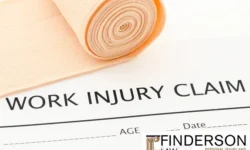
Guide to receiving workers’ comp after suffering from PTSD in Indiana
When you get a bad cut or broken bone at work, the answer is clear that you need to file for workers’ compensation. However, mental and psychological injuries often fall within a gray area, and many workers are unaware that they may be entitled to compensation for post-traumatic stress disorder (PTSD) in certain situations.
Although the legal view regarding mental health injuries is constantly changing, it helps to know where things stand now regarding workers’ compensation for PTSD in Indiana.
What is PTSD?
Post-traumatic stress disorder (PTSD) is a mental health condition that generates a sense of anxiety that impacts your everyday life. People with PTSD may experience a wide range of symptoms, many of which are disruptive to their ability to perform their normal job duties or enjoy life at home.
Without proper treatment, PTSD can progress to causing other mental and physical health issues such as eating and sleep disorders, anxiety attacks and depression. Additionally, PTSD can occur after a single traumatic event, or it can develop after a person experiences prolonged periods of stress.
Which occupations report the most cases of work-related PTSD?
The most common causes of work-related post-traumatic stress disorder are events that expose someone to psychological trauma. For example, a firefighter or first responder might develop PTSD after dealing with a traumatic fire that placed their life at risk. Nurses and doctors might experience PTSD after watching multiple patients die within a short period of time.
While some professions are considered higher risk than others, the reality is that any worker who is placed in potentially life-or-death situations is at higher risk for developing occupational PTSD.
For example, while it was once thought that teaching was a relatively safe position, the rise of school shootings has led to teachers also being at risk for psychological injuries due to their job. In addition, construction workers and professional drivers are also among some of the most common occupations for developing PTSD.
What are the symptoms of PTSD?
The symptoms of work-related PTSD often mimic other mental health conditions since they can include depression and anxiety. You may also notice that you experience flashbacks or spend time constantly reliving the traumatic incident in your mind. You may even feel the need to retell the story to as many people as possible. This is your brain trying to process what happened.
People with PTSD often describe feeling like they are constantly on edge and waiting for another similar type of event to happen. Nightmares and sleep disruptions are common if the brain is unable to relax and heal from the event.
All of these disruptive symptoms can further cause you to retreat from the people that you love since you may feel angry, irritable and even guilty for surviving the incident if others did not.
Although PTSD is considered a mental health condition, it can have a tremendous impact on your physical well-being, too. People with PTSD and co-occurring physical injuries may notice that it takes longer for their bodies to heal. You are also more likely to experience headaches, back pain, ulcers and chronic fatigue due to the tremendous stress that your mind and body are under.
In some cases, PTSD could cause you to sustain an injury at work. For example, a sleepless night could increase your chances of having an accident while driving.
Can you recover from job-related PTSD?
The good news is that it’s possible to recover from PTSD. The bad news is that the road to recovery tends to be long and challenging. It’s common for PTSD to become a chronic condition. This means that you may need financial help to cover missed workdays, ongoing counseling and other types of treatment to help you achieve your best chances at learning how to manage your condition. PTSD can be treated with a combination of mental health therapy and medications.
Depending on the symptoms of your PTSD, you may also need additional medical treatments. For instance, you may need special care to address issues that arose after the trauma, such as gastrointestinal issues or ulcers. Keeping track of all of your developing health issues and their treatments gives you a better chance at proving that you received a mental injury at work.
Can you get workers’ compensation in Indiana for mental injuries?
Indiana workers’ compensation law covers both physical and psychological injuries like PTSD, but only in certain situations.
For starters, the injury must be job-related, which can be harder to prove with PTSD. Typically, people who work in occupations with a high risk of exposure to traumatic events are more likely to get mental health injuries covered since it’s easier to point to 1 or more events that could cause the symptoms.
In addition, workers in Indiana may only be eligible to have their mental injury covered so long as it’s tied to a physical injury, and their psychological well-being is impacting their ability to have a full recovery. If you experience a physical bodily injury that is caused by psychological trauma you experienced in the workplace, then your mental health condition may be covered.
Your physical and mental health often impact each other, so it’s important to know that PTSD tends to be a lifelong condition that requires ongoing care. Since getting this type of injury covered can be challenging in Indiana, it’s best to work with a workers’ compensation lawyer who can stay on top of the latest changes regarding how mental injuries are treated under constantly changing laws.



 744 E Till Rd, Suite 102
744 E Till Rd, Suite 102

